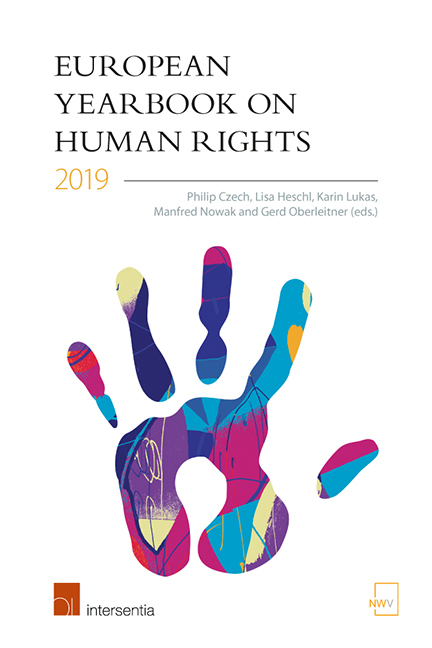Book contents
- Frontmatter
- Miscellaneous Frontmatter
- Editors’ Preface
- Contents
- List of Abbreviations
- List of Contributors
- PART I TOPIC OF THE YEAR
- PART II EU
- PART III CoE
- PART IV OSCE
- PART V REPORTS FROM THE FIELD
- OSCE Moscow Mechanism: Situation of Human Rights in Chechnya
- A Human Rights Approach to Deal witheconomic and Corruption Issues in Ukraine
- PART VI OTHERS
- PART VII BOOK REVIEWS
- Index
OSCE Moscow Mechanism: Situation of Human Rights in Chechnya
from PART V - REPORTS FROM THE FIELD
Published online by Cambridge University Press: 24 January 2020
- Frontmatter
- Miscellaneous Frontmatter
- Editors’ Preface
- Contents
- List of Abbreviations
- List of Contributors
- PART I TOPIC OF THE YEAR
- PART II EU
- PART III CoE
- PART IV OSCE
- PART V REPORTS FROM THE FIELD
- OSCE Moscow Mechanism: Situation of Human Rights in Chechnya
- A Human Rights Approach to Deal witheconomic and Corruption Issues in Ukraine
- PART VI OTHERS
- PART VII BOOK REVIEWS
- Index
Summary
ABSTRACT
In November 2018 the so-called ‘Moscow Mechanism’ of the Organization for Security and Cooperation in Europe (OSCE) was invoked against the Russian Federation (RF) in order to investigate ‘allegations of impunity for reported human rights violations and abuses in Chechnya from January 2017 to the present’’. A focus was on the most serious violations like harassment and persecution, arbitrary arrests or detentions, torture and enforced disappearances as well as extra-judicial executions and the situation of persons persecuted for their sexual orientation or their activities as human rights defenders, lawyers, independent journalists or members of civil society. The author of this contribution has been appointed as single rapporteur and based on his report explains the nature of the Moscow Mechanism, the methodology used and the main findings reached with regard to his mandate. He also summarises the conclusions and recommendations of the report and ends with some general conclusions on the relevance of the Moscow Mechanism for serious human rights violations in the OSCE area.
INTRODUCTION
In 2017 disturbing reports on several waves of persecutions of lesbian, gay, bisexual, transgender and intersex (LGBTI) persons in Chechnya reached the global public. According to the news, the Chechen authorities had organised a series of ‘purges’ against persons because of their assumed sexual orientation as gays or lesbians leading to their arrest, torture and even to extra-judicial killings. Nobody was held accountable for these actions raising an issue of impunity. The persecutions added to allegations of numerous other human rights violations like the summary extra-judicial killings of a number of suspected terrorists and the clamp down on civil society and journalists active for upholding human rights in the Chechen Republic.
After talks based on the so-called ‘Vienna Mechanism’ in the framework of OSCE to reach clarifications and requests for accountability were considered not conducive a group of 16 OSCE participating States invoked the so-called ‘Moscow Mechanism’ with the purpose to seek clarification on the situation through a fact-finding mission. The author of this contribution was chosen as single rapporteur and presented his findings and recommendations in December 2018 to the Permanent Council (PC) of OSCE in Vienna.
- Type
- Chapter
- Information
- European Yearbook on Human Rights 2019 , pp. 419 - 438Publisher: IntersentiaPrint publication year: 2019
- 3
- Cited by



